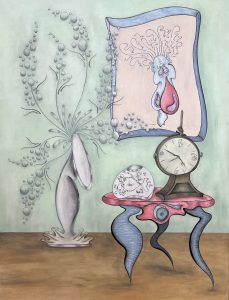I contend everyone needs a Gollum.
For those of you living under a rock, Gollum is a villainous creature from whom the one ring is taken by the Hobbit, Bilbo Baggins. Thereafter, Bilbo’s nephew, Frodo, is charged with destroying the ring. Gollum, torn with being free of the power of the ring, and powerless to escape its control, pursues Frodo through the ring trilogy. Therein, Gollum promises to guide Frodo to the fires of Mordor to destroy the ring — but plans to kill Frodo and recover the precious ring.
Yes, I’m a nerd.
No masterpiece is complete without a villain. Allow me to differentiate between the role of villain and antagonist. The antagonist is directly opposed to the protagonist. In Othello, for example, the antagonist is Othello’s own lack of self-esteem. It is Othello’s internal self-doubt that drives his madness. Iago only pokes at Othello’s weaknesses and is therefore a villain who is vital to move the plot forward. English professors will tell you that the villain is the primary antagonist and that any story can have numerous antagonists. I’d argue the antagonist is the primary opponent, while the villain is the direct and obvious opponent. In The Lord of the Rings, the antagonist to the entirety of Middle Earth is the demon, Sauron. However, without Gollum’s direct interference and villainy, the plot would not move forward to resolution.
Yes, I’m a major nerd. But I digress.
Iconic villains actively create chaos to compound the protagonist’s challenges. In our personal life stories, to face life’s antagonists like childhood trauma, career quandaries, socio-economic quagmires, health threats, or the nasty neighbor who builds his shed onto your property, are not enough. While these life antagonists drive your personal hero’s journey, the magic of your story resides with petty annoyances in the form of villains who make your life harder, actively threaten your sanity, and impinge on your success. However, villains give you the opportunity to grow so you can conquer your antagonists.
Attracting Your Villian
Before I describe the benefits of your very own Gollum, allow me to digress about how you can attract your very own villain-pet:
First, be a kind, open, and compassionate person with weak boundaries. Always see the good in the other, no matter how many times he or she hurts you. So, be Frodo not Sam. Where Sam is astute and clearly sees Gollum’s evil intentions, Frodo continues to protect and trust the little demon. Second, question your own sanity and judgment no matter how much pain your villain causes you. Third, and crucial to a successful relationship with your villain, believe that you deserve every gallon of feces he or she dumps all over.
Now… for a little more nerdville…
Notice, for example, how Harry Potter never adopts his villain, Draco Malfoy. Harry, no matter his trauma, has high self-esteem and high self-trust. Although he has a compassionate and open heart, Harry spots inconsistency and those with ill intent and he never gets into bed with those he deems untrustworthy.
You are a Frodo if you have that gut instinct and ignore it. Soon, you’ll be full of venom, naked, and wrapped in a spider’s web. But you can learn from your misguided kindness.
Villian Benefits
You may not think having your own personal villain has any benefits. But you would be wrong! Here are ten signs of a Gollum with respective reasons having a Gollum will enhance your life and help you master precious life lessons.
One: Someone who prefers fast food to your gourmet cooking.
While oddly specific, I offer this point to illustrate a concept: your villain will consistently negate your talent and skill, knowledge and expertise. You’re a tax attorney, but his mechanic-buddy from the bar knows tax law far better than you do. You are a trained chef, but your Gollum insists fast food tastes better. Your villain’s insipid commentary slowly and steadily erodes your self-concept.
What you learn: Not everyone’s opinion is valuable or desirable. Find new friends, new clients, new customers, new followers.
Two: Someone, although legally an adult, requires parenting.
Gollum enters the sacred pool and is about to be shot. Frodo coaxes him from the water’s edge to save him. Similarly, your villain requires supervision, intervention, and saving. He can’t balance his own checkbook. She forgets to put gas in the car. She oversleeps or refuses to work and when she does, complains endlessly like a third-grader writing a five-page report. You find yourself correcting his behavior, doing her laundry, and managing your household alone.
What you learn: Recognize when a person is not emotionally ready for adulthood, nevermind an adult relationship. If you have to police and parent someone in your life, you have spotted your Gollum! Find the parity you deserve.
Three: Someone who does not control his or her temper and who you feel compelled to defend.
She snaps at the server because the food took too long. He abuses the store clerk because the store is out of screws. She trashes the apartment because she had a bad day. He punches the wall — or you — because he’s having an episode. And you never disclose the abusive and violent nature your Gollum displays. Whether you are protecting your decision to stay connected to this person, or you are protecting his or her public image, you remain in a constant state of anxiety.
What you learn: Some hard reality for you. You allow this behavior. Realize that your defense and acquiescence is a failure to uphold your own boundaries. It’s time to demand peace, respect, and healthy communication.
Four: Someone interferes with your healthy relationships.
He refuses to go to your friend’s party. She doesn’t invite you to participate in phone calls with her family. He regularly insults the people you love and trust, insisting they are not good for you. Your boss is an asshole. Your kid is needy. Your best friend is using you. Steadily, he works for you to distance yourself from those who will spot his villainy. He must get rid of them just as Gollum worked to get rid of Sam, so Frodo would be alone and unprotected.
What you learn: If a person who you have historically loved and respected suggests your Gollum is untrustworthy, don’t get defensive. Notice the history of the critic. You become aware that your own opinion is the only opinion. You learn to examine facts, not to follow wayward criticism. Protect your healthy relationships and trust those who have earned your trust.
Five: Someone who false swears and lies.
How else will you differentiate between true and false if you don’t have that special person who lies right to your face? Consider it an intuition exercise. He is not texting his ex. Don’t you remember your father didn’t want you to have his journals — no matter what his will says? No, he didn’t throw out the cheese you needed for your recipe. The cheese was never in the fridge.
In the vernacular, we call this behavior gaslighting. The term is based on the classic Ingrid Bergman film, Gaslight, where the villain actively seeks to convince his wife that she is going insane. In life, if you question your sanity, your villain is doing his best gaslight attempt.
What you learn: You learn to trust your own version of the truth and your own judgment. You learn to follow facts — and not agree with another person just because he or she insists over and over. If you know you put the cheese in the fridge, you did. And check your phone records — he’s texting his ex.
Six: Someone who uses your weaknesses against you.
Gollum actively uses Frodo’s burden of the ring, and fear of being hunted against him. Building that fear forces Frodo to put his trust in Gollum. Your villain is committing the same slight-of-hand. He frowns when you get ready for your night out — when he knows you are trying to lose weight. Or she likes her ex’s posts but tells you the repeated act means nothing. He criticises your tenuous relationship with a sibling or she asks repeatedly if your boss is going to fire you. Or, you have rejection trauma and he’s always threatening to leave you. It’s subtle but relentless.
What you learn: A supportive person will know your triggers and weak spots — and will never poke at them. He’ll tell you you look great. She would never give any attention to another paramour. He will encourage a healing between you and your sibling. She would tell you how valuable you are at work. And he would regularly affirm that he adores and values you, so you always feel safe. That’s a loyal friend. Like Sam, who never leaves even when Frodo demands he does.
Seven: Someone who appears to be loving but hides a darker self who only values self-interest.
He bought you dinner, but then makes a demand. She made you dinner, but then announces she’s going out with friends without you. She uses your credit card to buy herself gifts — but knows you don’t mind because she got you something, too! You were supposed to have a romantic vacation, but you end up at her high school reunion. The guise of love and devotion offered to manipulate.
What you learn: When someone cares, they respect your physical and emotional health. They don’t just protest they love you — they show it. A loving person does not give a gift with expectation of reward — and they don’t just give gifts on certain days. They love you and give from the heart every day.
Eight: Someone who shows you the way to your demise.
Like Gollum leads Frodo through Shelob’s lair, your villain puts you in harm’s way — and god-forbid you call it out! He introduces you to a new client and insists you do the work for free because she is his friend. He insists you be nice to the girl at the bar who likes to sit on his lap when you are not around. He tells you he wants you to be healthy, but buys you ice-cream. He demands you handle the family legal work, and then invites others he knows to criticize your efforts, reminding you you are a disappointment.
What you learn: When your gut tells you the path, adopt it as your truth. When your intuition sends up red flags that something is amiss, listen. You know when your boundaries are violated, and it’s your responsibility to speak up.
Nine: After trying to kill you, someone who complains that you have restricted him or her.
You refuse to answer the phone. You offer the silent treatment. You say no. You sleep on the couch. And your villain will rage. How could you do this to him? It burns!! You, with your compassionate, open heart, pity the person. He’s sorry. I must have really hurt him. You offer your perspective and your feelings and are told you are being dramatic, or cruel, or a liar. Anything you do to assert boundaries is dismissed as mean — triggering your sensitive heart.
What you learn: When you get Gollum in a noose, keep him there. A good person — an honest person — will accept the penalty or the assertion of your boundaries with grace and apology. The conversation will never be one of protest. The conversation will request how that other person can respect you and do better next time. And the actions will follow.
Ten: Someone whose own villainy ultimately saves you.
Stop obsessing whether your Gollum is a narcissist, suffers from Borderline Personality Disorder or Bipolar Depression, or substance abuse. Stop concerning yourself with understanding his or her motivation for destroying you. Life is not an English essay. You don’t need to arrive at a thesis. Your Gollum is responsible for his or her own mental health — and his or her actions.
But here’s the hardest lesson: Why do you let this person tag along? Be in your life? Unsettle you? Eviscerate your peace and mental health?
What you learn: You finally recognize that your villain reflects your inner demons. Like Iago to Othello, your Gollum says the words you anticipate and commits the crimes your victim mindset demands. Your trauma insists you keep perpetuating your victim script — but now you see it and can be free of it. Once you awaken to that truth, you can cast Gollum — and your inner pain (in the form of an enchanted ring or childhood trauma) into the fire whence it came.
But you may lose a finger and need eagles to save you.

Portraits Of Gen X Xenophobes: An Interview With Artist Gene Stout
Image of The Wake of X4 by Gene Stout


